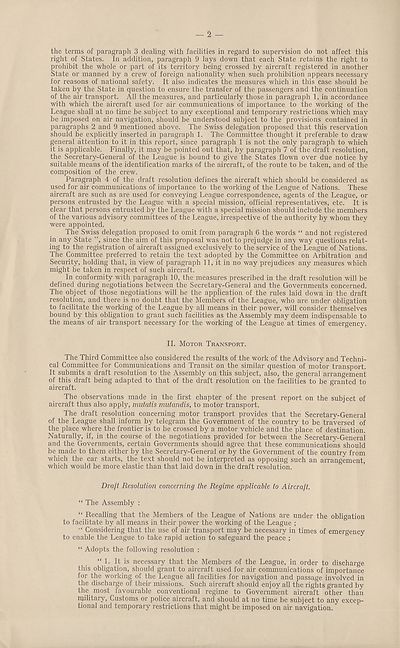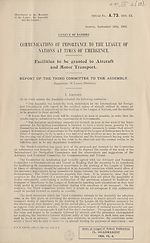Download files
Complete book:
Individual page:
Thumbnail gallery: Grid view | List view

the terms of paragraph 3 dealing with facilities in regard to supervision do not affect this
right of States. In addition, paragraph 9 lays down that each State retains the right to
prohibit the whole or part of its territory being crossed by aircraft registered in another
State or manned by a crew of foreign nationality when such prohibition appears necessary
for reasons of national safety. It also indicates the measures which in this case should be
taken by the State in question to ensure the transfer of the passengers and the continuation
of the air transport. All the measures, and particularly those in paragraph 1, in accordance
with which the aircraft used for air communications of importance to the working of the
League shall at no time be subject to any exceptional and temporary restrictions which may
be imposed on air navigation, should be understood subject to the provisions contained in
paragraphs 2 and 9 mentioned above. The Swiss delegation proposed that this reservation
should be explicitly inserted in paragraph 1. The Committee thought it preferable to draw
general attention to it in this report, since paragraph 1 is not the only paragraph to which
it is applicable. Finally, it may be pointed out that, by paragraph 7 of the draft resolution,
the Secretary-General of the League is bound to give the States flown over due notice by
suitable means of the identification marks of the aircraft, of the route to be taken, and of the
composition of the crew.
Paragraph 4 of the draft resolution defines the aircraft which should be considered as
used for air communications of importance to the working of the League of Nations. These
aircraft are such as are used for conveying League correspondence, agents of the League, or
persons entrusted by the League with a special mission, official representatives, etc. It is
clear that persons entrusted by the League with a special mission should include the members
of the various advisory committees of the League, irrespective of the authority by whom they
were appointed.
The Swiss delegation proposed to omit from paragraph 6 the words “ and not registered
in any State ”, since the aim of this proposal was not to prejudge in any way questions relat¬
ing to the registration of aircraft assigned exclusively to the service of the League of Nations.
The Committee preferred to retain the text adopted by the Committee on Arbitration and
Security, holding that, in view of paragraph 11, it in no way prejudices any measures which
might be taken in respect of such aircraft.
In conformity with paragraph 10, the measures prescribed in the draft resolution will be
defined during negotiations between the Secretary-General and the Governments concerned.
The object of those negotiations will be the application of the rules laid down in the draft
resolution, and there is no doubt that the Members of the League, who are under obligation
to facilitate the working of the League by all means in their power, will consider themselves
bound by this obligation to grant such facilities as the Assembly may deem indispensable to
the means of air transport necessary for the working of the League at times of emergency.
II. Motor Transport.
The Third Committee also considered the results of the work of the Advisory and Techni¬
cal Committee for Communications and Transit on the similar question of motor transport.
It submits a draft resolution to the Assembly on this subject, also, the general arrangement
of this draft being adapted to that of the draft resolution on the facilities to be granted to
aircraft.
The observations made in the first chapter of the present report on the subject of
aircraft thus also apply, mutatis mutandis, to motor transport.
The draft resolution concerning motor transport provides that the Secretary-General
of the League shall inform by telegram the Government of the country to be traversed of
the place where the frontier is to be crossed by a motor vehicle and the place of destination.
Naturally, if, in the course of the negotiations provided for between the Secretary-General
and the Governments, certain Governments should agree that these communications should
be made to them either by the Secretary-General or by the Government of the country from
which the car starts, the text should not be interpreted as opposing such an arrangement,
which would be more elastic than that laid down in the draft resolution.
Draft Resolution concerning the Regime applicable to Aircraft.
“ The Assembly :
“ Recalling that the Members of the League of Nations are under the obligation
to facilitate by all means in their power the working of the League ;
Considering that the use of air transport may be necessary in times of emergency
to enable the League to take rapid action to safeguard the peace ;
“ Adopts the following resolution :
“ L It is necessary that the Members of the League, in order to discharge
this obligation, should grant to aircraft used for air communications of importance
for the working of the League all facilities for navigation and passage involved in
the discharge of their missions. Such aircraft should enjoy all the rights granted by
the most favourable conventional regime to Government aircraft other than
military, Customs or police aircraft, and should at no time be subject to any excep¬
tional and temporary restrictions that might be imposed on air navigation.
right of States. In addition, paragraph 9 lays down that each State retains the right to
prohibit the whole or part of its territory being crossed by aircraft registered in another
State or manned by a crew of foreign nationality when such prohibition appears necessary
for reasons of national safety. It also indicates the measures which in this case should be
taken by the State in question to ensure the transfer of the passengers and the continuation
of the air transport. All the measures, and particularly those in paragraph 1, in accordance
with which the aircraft used for air communications of importance to the working of the
League shall at no time be subject to any exceptional and temporary restrictions which may
be imposed on air navigation, should be understood subject to the provisions contained in
paragraphs 2 and 9 mentioned above. The Swiss delegation proposed that this reservation
should be explicitly inserted in paragraph 1. The Committee thought it preferable to draw
general attention to it in this report, since paragraph 1 is not the only paragraph to which
it is applicable. Finally, it may be pointed out that, by paragraph 7 of the draft resolution,
the Secretary-General of the League is bound to give the States flown over due notice by
suitable means of the identification marks of the aircraft, of the route to be taken, and of the
composition of the crew.
Paragraph 4 of the draft resolution defines the aircraft which should be considered as
used for air communications of importance to the working of the League of Nations. These
aircraft are such as are used for conveying League correspondence, agents of the League, or
persons entrusted by the League with a special mission, official representatives, etc. It is
clear that persons entrusted by the League with a special mission should include the members
of the various advisory committees of the League, irrespective of the authority by whom they
were appointed.
The Swiss delegation proposed to omit from paragraph 6 the words “ and not registered
in any State ”, since the aim of this proposal was not to prejudge in any way questions relat¬
ing to the registration of aircraft assigned exclusively to the service of the League of Nations.
The Committee preferred to retain the text adopted by the Committee on Arbitration and
Security, holding that, in view of paragraph 11, it in no way prejudices any measures which
might be taken in respect of such aircraft.
In conformity with paragraph 10, the measures prescribed in the draft resolution will be
defined during negotiations between the Secretary-General and the Governments concerned.
The object of those negotiations will be the application of the rules laid down in the draft
resolution, and there is no doubt that the Members of the League, who are under obligation
to facilitate the working of the League by all means in their power, will consider themselves
bound by this obligation to grant such facilities as the Assembly may deem indispensable to
the means of air transport necessary for the working of the League at times of emergency.
II. Motor Transport.
The Third Committee also considered the results of the work of the Advisory and Techni¬
cal Committee for Communications and Transit on the similar question of motor transport.
It submits a draft resolution to the Assembly on this subject, also, the general arrangement
of this draft being adapted to that of the draft resolution on the facilities to be granted to
aircraft.
The observations made in the first chapter of the present report on the subject of
aircraft thus also apply, mutatis mutandis, to motor transport.
The draft resolution concerning motor transport provides that the Secretary-General
of the League shall inform by telegram the Government of the country to be traversed of
the place where the frontier is to be crossed by a motor vehicle and the place of destination.
Naturally, if, in the course of the negotiations provided for between the Secretary-General
and the Governments, certain Governments should agree that these communications should
be made to them either by the Secretary-General or by the Government of the country from
which the car starts, the text should not be interpreted as opposing such an arrangement,
which would be more elastic than that laid down in the draft resolution.
Draft Resolution concerning the Regime applicable to Aircraft.
“ The Assembly :
“ Recalling that the Members of the League of Nations are under the obligation
to facilitate by all means in their power the working of the League ;
Considering that the use of air transport may be necessary in times of emergency
to enable the League to take rapid action to safeguard the peace ;
“ Adopts the following resolution :
“ L It is necessary that the Members of the League, in order to discharge
this obligation, should grant to aircraft used for air communications of importance
for the working of the League all facilities for navigation and passage involved in
the discharge of their missions. Such aircraft should enjoy all the rights granted by
the most favourable conventional regime to Government aircraft other than
military, Customs or police aircraft, and should at no time be subject to any excep¬
tional and temporary restrictions that might be imposed on air navigation.
Set display mode to:
![]() Universal Viewer |
Universal Viewer | ![]() Mirador |
Large image | Transcription
Mirador |
Large image | Transcription
Images and transcriptions on this page, including medium image downloads, may be used under the Creative Commons Attribution 4.0 International Licence unless otherwise stated. ![]()
| League of Nations > Armament > Communications of importance to the League of Nations at times of emergency > (2) |
|---|
| Permanent URL | https://digital.nls.uk/195385299 |
|---|
| Shelfmark | LN.IX |
|---|
| Description | Over 1,200 documents from the non-political organs of the League of Nations that dealt with health, disarmament, economic and financial matters for the duration of the League (1919-1945). Also online are statistical bulletins, essential facts, and an overview of the League by the first Secretary General, Sir Eric Drummond. These items are part of the Official Publications collection at the National Library of Scotland. |
|---|---|
| Additional NLS resources: |
|

